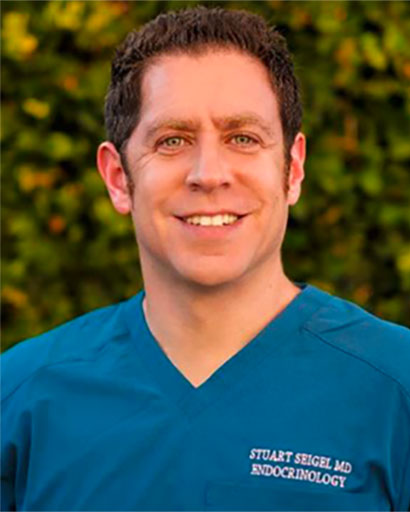Overview
The thyroid gland, shaped like a butterfly’s wings, is located at the base of your neck under your Adam’s apple. It produces hormones that regulate your heart, temperature, and weight. There are four types of thyroid cancer, and overall, this type of cancer has a 99% survival rate. Of the 53,000 Americans who receive a thyroid cancer diagnosis every year, only about 2,000 cases are fatal.
Causes
What are the causes of thyroid cancer?
It is not known why a normal thyroid gland becomes cancerous. Cells in the thyroid gland can change (mutate) for several reasons. These changes allow them to start replicating rapidly. They also lose the normal ability to die. As the abnormal cells continue to replicate quickly and accumulate, they form a tumor. The abnormal cells can also spread (metastasize) to other parts of the body and form additional cancerous tumors.
Are there risk factors that can increase my likelihood of having thyroid cancer?
- Being female increases your chances three-fold
- Being overweight
- Having radiation therapy treatments to the head and neck, especially as a child
- Family history of thyroid cancer or disease
- Exposure to radioactive fallout or a nuclear power plant accident
Can thyroid cancers recur?
It is uncommon for thyroid cancer to return. However, even if your thyroid has been treated successfully or removed, it is possible for thyroid cancer to return. Cancer cells may have spread to other parts of your body before the thyroid gland was removed, or the thyroid tissue was not completely removed during surgery. As a result, it may return to your lymph nodes, lungs, or bones. Thyroid cancer that returns can still be treated successfully.
Symptoms
What are the symptoms of thyroid cancer?
At first, there are no symptoms. As the cancer spreads, you may have pain and swelling in your neck. Other symptoms can include:
- Pain in the jaws or ears
- A lump in your neck that you can feel through the skin
- Swollen lymph nodes in your neck
- Problems swallowing or breathing
- Hoarseness or changes in your voice
Diagnosis
How is thyroid cancer diagnosed?
Diagnosis begins with a blood test to check hormone levels and how your thyroid is functioning. Next, a biopsy is performed on the tumor cells to determine the type of thyroid cancer and in some cases test for genetic markers. Knowing the type of cancer helps your doctor prescribe treatment and determine your outcome (prognosis). To see if cancer has spread, a radioiodine scan, MRI, CT, or PET scan may be used.
How many types of thyroid cancer are there?
There are four different types of thyroid cancer.
- Papillary thyroid cancer is the most common (80% of all cases) and occurs in the cells that produce and store hormones, called follicular cells. It usually affects people between the ages of 30 to 50, although it can occur at any age.
- Follicular thyroid cancer also occurs in the follicular cells, but it usually happens to people over 50 and is more likely to spread to bones or lungs. It makes up about 15% of cases.
- Medullary thyroid cancer starts in the thyroid’s C cells, which produce the hormone calcitonin. If a blood test shows high levels of calcitonin, it could point to medullary thyroid cancer at an early stage, when it is the most treatable. This may be part of a hereditary multiple endocrine neoplasia syndrome.
- Anaplastic thyroid cancer also begins in the follicular cells. It grows rapidly and is difficult to treat. This very aggressive type only comprises 2% of diagnoses and usually occurs in people over the age of 60.
There are other, very rare types of thyroid cancer:
- Thyroid lymphoma, which begins in the thyroid’s immune system
- Thyroid sarcoma, which begins in the thyroid’s connective tissue.
Treatment
How is thyroid cancer treated?
Thyroid cancer has a very high cure rate. Your chances of a cure increase with early diagnosis and treatment and if the cancer has not spread to other parts of your body.
Treatment can include:
- Surgery to remove all or part of your thyroid is the most widely used treatment. If cancer has spread to the lymph nodes, they may also be removed.
- Radioiodine therapy can shrink and/or destroy the cancer and diseased gland.
- Radiation can kill cancer cells and stop them from growing.
- Chemotherapy can kill cancer cells and stop the cancer from growing.
- Hormone therapy stops the release of hormones to prevent the cancer from spreading or returning.
What treatment is best?
Your treatment will be determined based on the type and stage of cancer and your overall health. If your cancer is advanced, or you have an aggressive type that cannot be cured, treatment will focus on stopping it from growing and spreading by removing or destroying as much cancer as possible. Treatment may also focus on relieving pain and swallowing problems. After treatment, your doctor will order regular blood tests or thyroid scans to check for cancer recurrence.
Who treats thyroid cancer?
Your thyroid cancer treatment team can include surgeons, endocrinologists who treat diseases in hormone-producing glands, and oncologists who use radiation or chemotherapy. Your treatment team may also include psychologists, nurses, rehabilitation specialists, or social workers. The endocrine specialists at Inland Endocrine provide patients with the personalized care necessary to accurately diagnose and treat thyroid cancers.
References
Mayo Clinic. Jan 21, 2020. Thyroid Cancer. Retrieved June 19, 2021, {https://www.mayoclinic.org/diseases-conditions/thyroid-cancer/symptoms-causes/syc-20354161}
American Cancer Society. n.d. Treating Thyroid Cancer. Retrieved June 19, 2021, {https://www.cancer.org/cancer/thyroid-cancer/treating.html}
Cleveland Clinic. n.d. Thyroid Cancer. Retrieved June 19, 2021, {https://www.thyroid.org/thyroid-cancer/}

